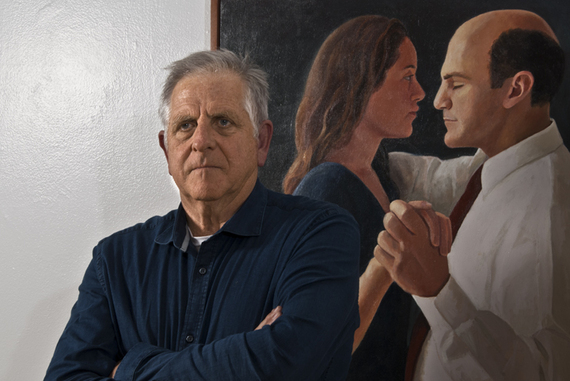Fake news is just the beginning
Facebook is on the defensive after the elections, with accusations that it helped spread misinformation. For days, Mark Zuckerberg was adamant that his network had not affected the election results, calling that “a pretty crazy idea”. But after a torrent of criticism from his employees and the media—and evidence to back it up—he relented and took responsibility. He promised to improve Facebook’s detection, reporting, and verification of news.
 An example of what I saw on my Facebook page on Nov 19, 2016
An example of what I saw on my Facebook page on Nov 19, 2016
Twitter has been a much worse offender, allowing hatemongers and trolls to harass its users. It has, for years, known about the large numbers of fake accounts and bots on its platform; yet it has failed to do much about them. The tech industry has stepped into the field of publishing and communications without accepting the responsibility that comes with doing so. Newspapers would never dare to publish the incendiary posts that are common on social media, because there are laws against hate speech. Yet social media platforms get away with pleading ignorance because there are no clear laws making them liable for what transpires on their networks.
The gaps between laws and ethics are growing exponentially as technologies advance. The ethical codes we live by and the laws we follow are changing very slowly while technologies move too fast to care. It isn’t greed and arrogance; more often than not, the technologies’ creators (and this probably includes Zuckerberg) don’t understand the power of their creations—and the damage they can do.
We are going to see much more of that.
Technologies such as computing, medicine, sensors, A.I., robotics, and genomics are now advancing exponentially and are converging. This means that one industry can encroach on another and cause the type of disruption that social media did to publishing. I doubt that anyone expected that a dating site set up by a college dropout, Mark Zuckerberg, would have had the ability to change the outcome of the U.S. elections.
The technology industry is building medical devices, robots, and self-driving cars from computers, sensors, and A.I.—the same types of technologies that Uber used to disrupt the taxi industry, and AirBnb, hotels. They have taken advantage of the gaps between laws and ethics, just as Facebook and Twitter have, to build billion-dollar businesses. This is what the future holds.
But are we ready for tech companies to become dominant players in the field of medicine, as will happen when we have A.I. applications that can do the work of doctors? Are we prepared for the elimination of millions of taxi- and truck-driver jobs when Uber’s self-driving vehicles begin to hit the roads? And are we ready for the “uberization” of large employment segments, as they move into what is called the gig-economy, in which they hire people on demand? All of this will become a reality in the next five or ten years.
The fact is that we are not prepared for any of it, just as we were not ready for the disruptions that social media caused. The tech industry, in particular, is happy to book the revenue it gains from other industries and to shirk responsibility for the damage it does. It is easier to pretend that the technologies do no harm than to deal with the problems they create.
Increasingly pervasive data networks and connected devices are enabling rapid communication and processing of information and ushering in unprecedented shifts—in everything from biology, energy, and media to politics, food, and transportation. They are redefining our future. It is imperative that we, as a society, understand technology’s impact on us and hold discussions and even heated debates about its use before that future becomes inevitable reality.
For Vivek Wadhwa's site, please click here.
To follow Vivek Wadhwa on Twitter, please click here.
TO FOLLOW WHAT'S NEW ON FACTS & ARTS, PLEASE CLICK HERE!
Vivek Wadhwa is a Fellow at Arthur & Toni Rembe Rock Center for Corporate Governance, Stanford University; Director of Research at the Center for Entrepreneurship and Research Commercialization at the Pratt School of Engineering, Duke University; and Distinguished Fellow at Singularity University. He is author of “The Immigrant Exodus: Why America Is Losing the Global Race to Capture Entrepreneurial Talent”—which was named by The Economist as a Book of the Year of 2012, and ” Innovating Women: The Changing Face of Technology”—which documents the struggles and triumphs of women. In 2012, the U.S. Government awarded Wadhwa distinguished recognition as an “Outstanding American by Choice”— for his “commitment to this country and to the common civic values that unite us as Americans”. He was also named by Foreign Policy Magazine as Top 100 Global Thinker in 2012. In 2013, TIME Magazine listed him as one of The 40 Most Influential Minds in Tech.
Wadhwa oversees research at Singularity University, which educates a select group of leaders about the exponentially advancing technologies that are soon going to change our world. These advances—in fields such as robotics, A.I., computing, synthetic biology, 3D printing, medicine, and nanomaterials—are making it possible for small teams to do what was once possible only for governments and large corporations to do: solve the grand challenges in education, water, food, shelter, health, and security.
In his roles at Stanford and Duke, Wadhwa lectures in class on subjects such as entrepreneurship and public policy, helps prepare students for the real world, and leads groundbreaking research projects. He is an advisor to several governments; mentors entrepreneurs; and is a regular columnist for The Washington Post, Wall Street Journal Accelerators, LinkedIn Influencers blog, Forbes, and the American Society of Engineering Education’s Prism magazine. Prior to joining academia in 2005, Wadhwa founded two software companies.



